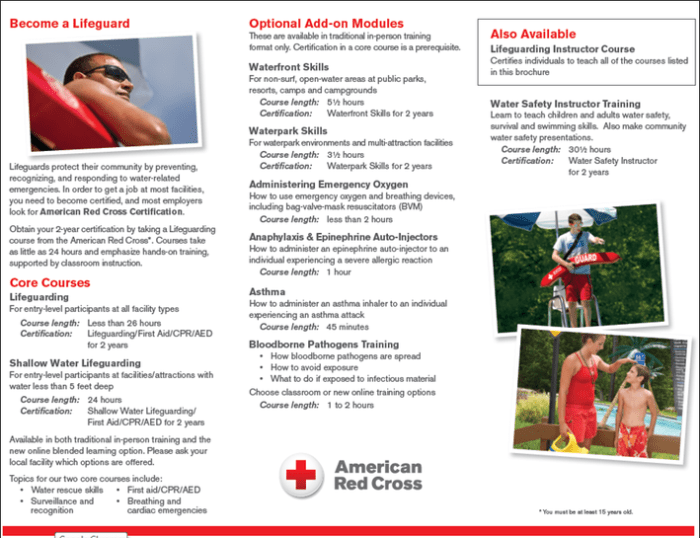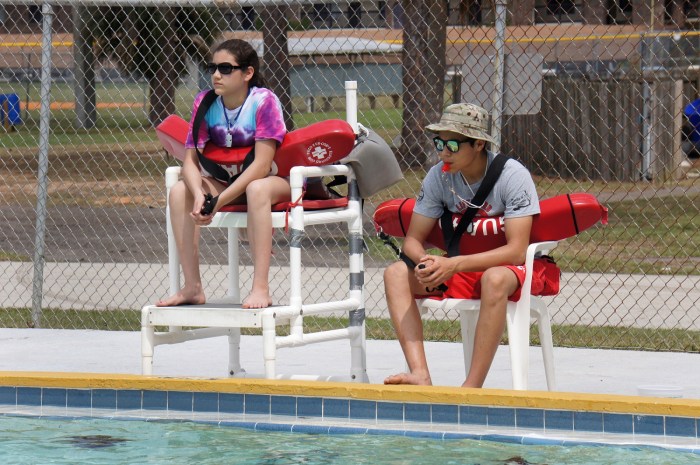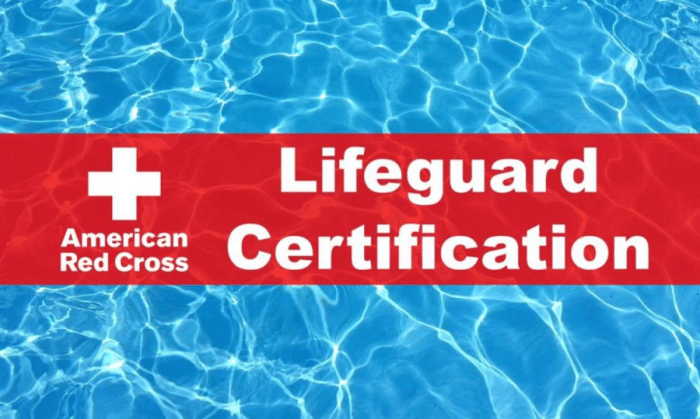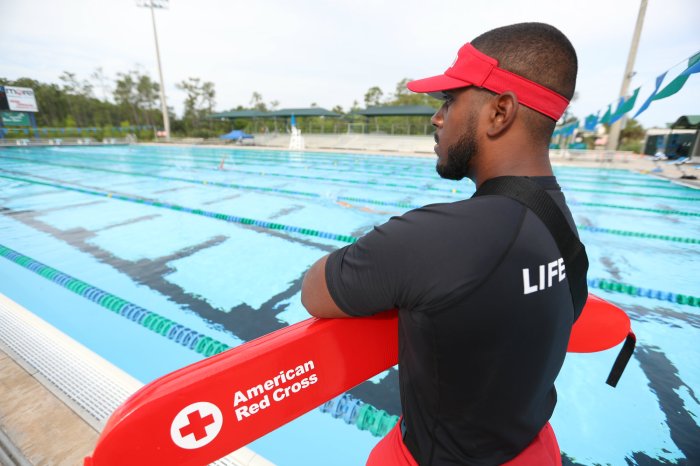Delving into the intricacies of lifeguarding, this guide unveils the significance of the Red Cross lifeguard written test PDF, an indispensable tool for aspiring lifeguards. By providing an in-depth exploration of its format, content, and strategies, this guide empowers individuals to navigate the test with confidence and achieve certification.
The Red Cross, renowned for its dedication to safety and emergency preparedness, plays a pivotal role in lifeguard training. Its written test serves as a crucial assessment of candidates’ knowledge and understanding of lifeguarding principles, ensuring their competence in safeguarding lives in aquatic environments.
Introduction

Lifeguard training and certification are crucial for ensuring the safety of swimmers and preventing drowning incidents. The Red Cross, a leading humanitarian organization, plays a vital role in providing comprehensive lifeguard training programs.
Written tests are an integral part of the Red Cross lifeguard certification process. They assess the knowledge and understanding of lifeguarding principles, emergency procedures, and rescue techniques. By successfully completing written tests, lifeguards demonstrate their proficiency in the essential skills and knowledge required to perform their duties effectively.
Role of the Red Cross in Lifeguard Training
The Red Cross offers a range of lifeguard training programs tailored to different levels of experience and responsibilities. These programs include:
- Lifeguarding
- Water Safety Instructor
- Aquatic Facility Operator
Red Cross lifeguard training programs are designed to meet the national standards established by the American National Standards Institute (ANSI) and the National Recreation and Park Association (NRPA). By adhering to these standards, the Red Cross ensures that its lifeguards are trained to the highest level of professionalism and competence.
Test Format and Structure

The Red Cross lifeguard written test typically consists of multiple-choice questions, true/false statements, and scenario-based questions. The test is designed to assess the candidate’s knowledge of lifeguarding principles, water safety, and emergency procedures.
Question Types
- Multiple Choice:These questions present a scenario or statement and provide several possible answers. The candidate must select the best answer from the options provided.
- True/False:These questions present a statement and ask the candidate to indicate whether it is true or false.
- Scenario-Based:These questions present a realistic scenario and ask the candidate to describe the appropriate actions to take. These questions assess the candidate’s ability to apply their knowledge to real-world situations.
Time Limit and Grading Criteria
The Red Cross lifeguard written test is typically timed, with a specific amount of time allotted to complete the test. The grading criteria vary depending on the testing organization, but generally, a passing score is required to demonstrate a satisfactory level of knowledge and understanding of the material covered in the test.
Content Coverage

The Red Cross lifeguard written test assesses candidates’ knowledge and understanding of essential lifeguarding principles and practices. Understanding these topics is crucial for effective lifeguarding, as it equips lifeguards with the theoretical foundation necessary to make informed decisions and perform their duties safely and efficiently.
The test covers a wide range of topics, including:
- Water rescue techniques
- First aid and CPR
- Lifeguard operations
- Risk management
- Legal responsibilities
Water Rescue Techniques
Candidates are tested on their knowledge of various water rescue techniques, including:
- Reach, throw, row, and go rescues
- Surface dives
- Underwater rescues
- Equipment use, such as life jackets and rescue tubes
First Aid and CPR
Lifeguards must possess a thorough understanding of first aid and CPR principles. The test assesses candidates’ knowledge of:
- Basic first aid techniques
- CPR and AED use
- Wound care and splinting
- Emergency medical services activation
Lifeguard Operations
Candidates are tested on their understanding of lifeguard operations, including:
- Scanning and surveillance techniques
- Patron supervision and interaction
- Emergency action plans
- Communication protocols
Risk Management
Lifeguards play a crucial role in risk management at aquatic facilities. The test assesses candidates’ knowledge of:
- Hazard identification and assessment
- Prevention and mitigation strategies
- Emergency preparedness
- Crowd control
Legal Responsibilities
Lifeguards must be aware of their legal responsibilities and limitations. The test assesses candidates’ understanding of:
- Duty to act
- Standard of care
- Legal liability
- Documentation and reporting
Test Preparation
Thorough preparation is crucial for success on the Red Cross lifeguard written test. Utilize these tips to enhance your chances of passing:
Study Materials and Resources
Obtain study materials such as the official Red Cross Lifeguarding Manual, online practice tests, and review materials from reputable sources.
Effective Study Strategies and Techniques
- Active Recall:Regularly test yourself on the material by covering the answers and trying to recall them from memory.
- Spaced Repetition:Review the material at increasing intervals to strengthen memory retention.
- Interleaving:Mix up different topics while studying to improve comprehension and prevent boredom.
- Retrieval Practice:Regularly retrieve information from memory without referring to notes to improve recall.
li> Elaboration:Explain the concepts to yourself or others to deepen your understanding.
Test-Taking Strategies: Red Cross Lifeguard Written Test Pdf

The Red Cross lifeguard written test assesses your knowledge and understanding of lifeguarding principles and practices. To perform well on the test, it is essential to have a solid preparation strategy and employ effective test-taking techniques.
Approaching the Test
Before taking the test, familiarize yourself with the test format, content coverage, and time limits. This will help you allocate your time wisely and focus on the most important areas.
Answering Different Question Types, Red cross lifeguard written test pdf
The test includes various question types, including multiple choice, true/false, and short answer. For multiple choice questions, read the question carefully and eliminate incorrect answers to narrow down your choices. For true/false questions, consider the accuracy of the statement and provide a clear response.
Short answer questions require concise and specific answers that demonstrate your understanding of the topic.
Time Management
Time management is crucial during the test. Allocate a specific amount of time to each question based on its difficulty. If you encounter a particularly challenging question, skip it and return to it later to avoid wasting valuable time.
Stress Management
It is natural to feel anxious during the test. To manage stress, practice relaxation techniques such as deep breathing or visualization. Stay focused on the task at hand and avoid dwelling on negative thoughts.
Sample Test Questions
The Red Cross lifeguard written test includes a variety of question types, including multiple choice, true/false, and short answer. The sample questions provided below are designed to give you a glimpse of the actual test and the topics covered.
Please note:The following questions are for illustrative purposes only and may not be representative of the exact questions you will see on the test.
Multiple Choice
- Which of the following is NOT a responsibility of a lifeguard?
- Supervising swimmers
- Enforcing pool rules
- Cleaning the pool
Correct Answer:Cleaning the pool
Explanation:Cleaning the pool is not a responsibility of a lifeguard. Lifeguards are responsible for supervising swimmers, enforcing pool rules, and responding to emergencies.
True/False
- Lifeguards must be at least 15 years old.
Correct Answer:True
Explanation:The minimum age to become a lifeguard with the Red Cross is 15 years old.
Short Answer
- Describe the steps you would take to rescue a swimmer who is in distress.
- Assess the situation and call for help if needed.
- Approach the swimmer from behind and grab them by the hair or clothing.
- Pull the swimmer to safety and perform CPR if necessary.
Correct Answer:The steps to rescue a swimmer who is in distress include:
Conclusion

The Red Cross lifeguard written test is a crucial step in obtaining lifeguard certification and safeguarding the lives of those in need. It evaluates candidates’ knowledge of lifeguarding principles, emergency procedures, and water safety protocols.
Lifeguard certification is an invaluable asset, demonstrating an individual’s commitment to protecting others. It empowers lifeguards to effectively respond to emergencies, prevent accidents, and provide essential assistance in aquatic environments.
Preparation and Success
Thorough preparation is essential for success on the Red Cross lifeguard written test. Candidates should familiarize themselves with the test format, content coverage, and sample questions. By dedicating time to study and practice, individuals can increase their confidence and improve their chances of passing the exam.
FAQs
What is the format of the Red Cross lifeguard written test?
The test typically consists of multiple choice, true/false, and scenario-based questions covering various lifeguarding topics.
What is the time limit for the test?
The time limit varies depending on the specific test, but it typically ranges from 60 to 90 minutes.
What topics are covered in the test?
The test covers essential lifeguarding knowledge, including water rescue techniques, CPR, first aid, and emergency procedures.